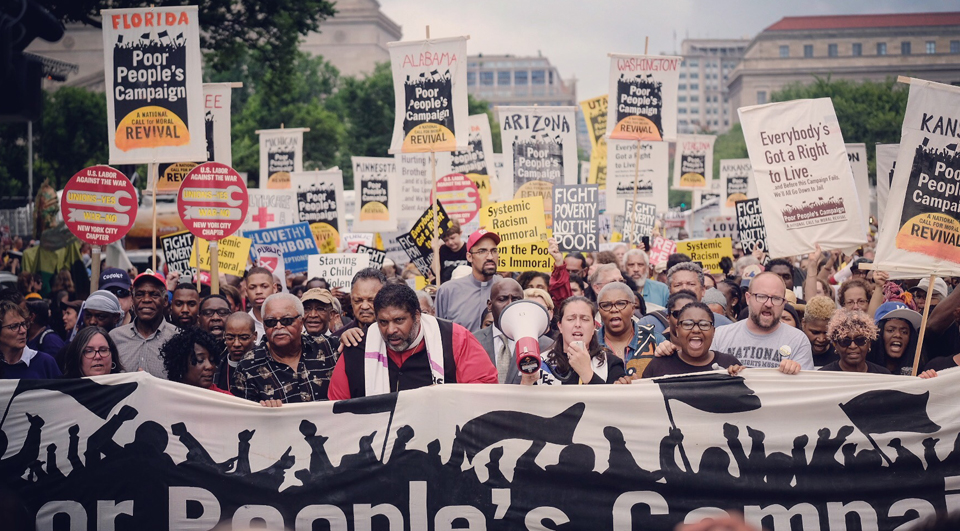
WASHINGTON—Culminating 40 days of marches and peaceful civil disobedience in Washington and state capitols, thousands of members and allies of the New Poor People’s Campaign brought their demands for ending systemic racism, systemic poverty, ecological devastation and the war economy to Congress – which may not be listening – on June 23.
And if lawmakers don’t listen, speakers said, the campaign’s next moves are massive voter education, registration and voting out politicians, of both parties, who don’t or won’t act. The Republicans, one speaker said, “won’t build a soul or interrupt violence,” while “elected Democrats won’t build a social safety net.”
Gesturing to the U.S. Capitol behind her, Rev. Traci Blackmon of the United Church of Christ led the crowd in a chant of “Whose house? Our house!” before adding, “Unless the folk who are occupying that house want to get in with us, then the folk who are occupying that house are going to move out.”
The NPPC laid out a six-point agenda and its co-chair, the Rev. William Barber, emphasized the issues are interrelated. People cannot stick to silos, he declared.
The NPPC wants the nation to commit to ending systemic racism, systemic poverty, ecological devastation, the war economy and militarism. Barber, and the campaign’s website, also denounce “the distorted moral narrative of religious nationalism.”
The NPPC builds on what Barber calls “the unfinished agenda” of Dr. Martin Luther King’s civil rights crusade of the 1960s. As he has reminded crowds in past sermons, the 1963 March on Washington was a “March for Jobs and Justice.” And before his murder, King organized the first Poor People’s encampment – which politicians then largely dismissed or ignored.
But the NPPC has gone beyond King’s themes in its weekly rallies, peaceful nonviolent civil disobedience – resulting in thousands of arrests – teach-ins and education sessions. Each week since Mother’s Day, campaigners have emphasized a different theme, including, in the week of June 16-22, workers’ rights. Barber and his co-chair, Rev. Liz Theoharis, have consistently tied all the themes together.
Whether lawmakers and other elected officials will change is another matter. The Republican-run House just passed legislation imposing work requirements on food stamp recipients, and Trump administration Housing Secretary Ben Carson plans to triple the rents for poor people who live in federally subsidized Section 8 housing, for example.
Meanwhile, GOP President Donald Trump rails against legal migrants to the U.S., GOP-run states enact voter-repression and anti-worker laws, and the GOP-named majority on the U.S. Supreme Court returns challenges to gerrymandered state legislatures back to lower courts.
And the campaign will continue, Barber and Theoharis declared.
Theoharis made the crowd promise to continue, too. “We must commit to going back to our states, back to our communities, back to our sovereign lands and organize, organize, organize!” Theoharis said. That means, she added “massive power-building and voter registration” among “poor and low-income people.” The nation’s ruling class exploits or ignores them, speakers said.
“We must cry out: Take away our poverty, not our children!” Theoharis added.
“We will stand together to declare enough cruelty, enough exploitation, enough amorality. It is time for something different,” one speaker, a young white man, said.
Unions sent busloads of members – four buses of United Food and Commercial Workers members from New York and New Jersey alone – to participate. The organizer of the buses, a stocky white worker who lives near Paterson, talked informally about the ills that brought them to D.C.
The problems of the communities of northern New Jersey, he said, include drugs, notably the opioid epidemic, and shootings, though few are related to gang violence. Downtown Paterson, he said, is hazardous after dark.
Barber reiterated, for the benefit of both the crowd and Congress, that the NPPC will continue.
“This is your graduation service,” he told the masses on the Mall. “We intend to fight the powers that be and against poverty and racism until this nation does what it promises, to establish justice for everybody.”
“The people are coming. We want them to hear us coming,” Blackmon said, again gesturing at the U.S. Capitol. “We want them to hear us coming. We want them to feel us coming.”
“We’ll do this again and again and again until policies change,” Barber said.

MOST POPULAR TODAY


Communist Karol Cariola elected president of Chile’s legislature

Zionist organizations leading campaign to stop ceasefire resolutions in D.C. area

Afghanistan’s socialist years: The promising future killed off by U.S. imperialism

High Court essentially bans demonstrations, freedom of assembly in Deep South






Comments